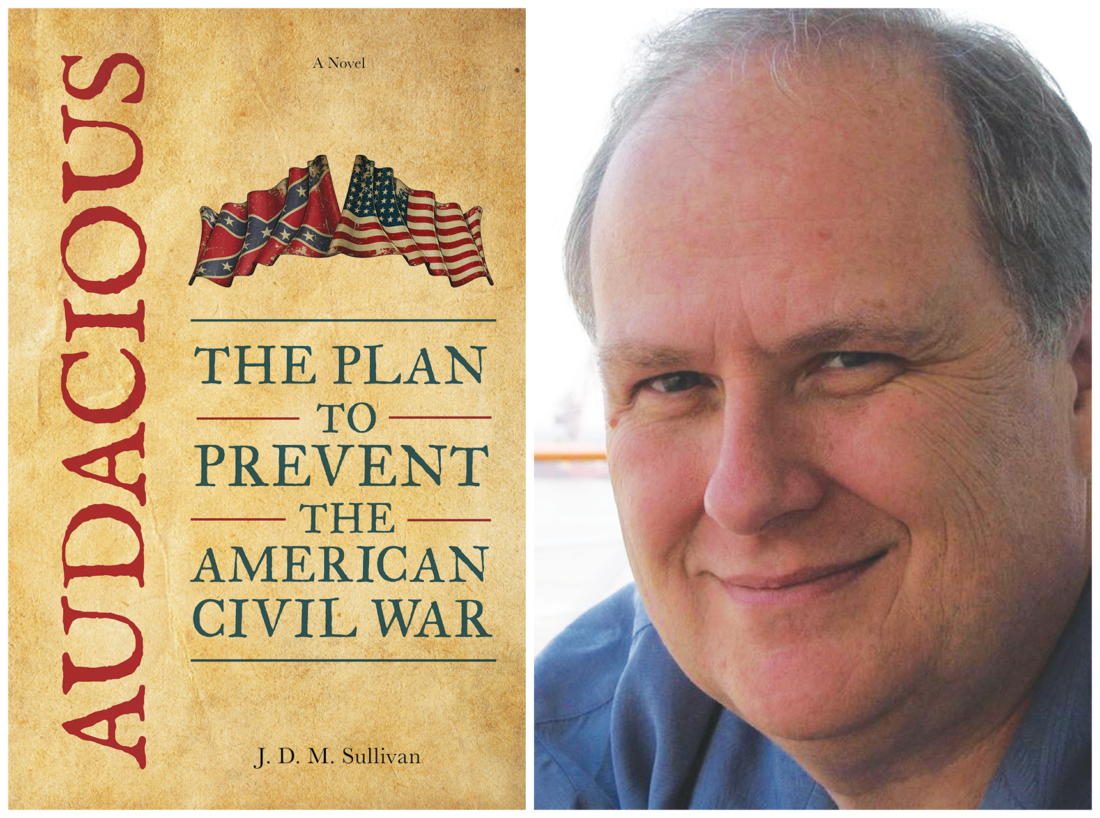In February 2019, David Sullivan was on his way to a performance at Flat Rock Playhouse when he noticed a historical marker on the side of the road. The plaque stated that Christopher Memminger, secretary of the treasury of the Confederacy, was buried at the nearby St. John in the Wilderness Cemetery. Sullivan took the sign as, well, a sign: The former corporate communication specialist-turned-filmmaker would try his hand at historical fiction.
Except Sullivan wasn’t interested in revisiting the actual Civil War. Instead, he wanted to explore how the conflict, which claimed an estimated 750,000 lives, could have been avoided. His debut novel, Audacious: The Plan to Prevent the American Civil War, offers readers an alternative history void of carnage and loss.
As Sullivan describes it, his book follows Blanton Caine, a fictitious Army lawyer and veteran of the Mexican-American War. By early 1861, with the U.S. on the brink of dissolution and bloodshed, President Abraham Lincoln commissions Caine to find a peaceful solution to reunite the country and abolish slavery.
Caine employs war games as one strategy. He also organizes leadership forums and peace talks in the mountains of Western North Carolina. Sullivan says his protagonist’s mission is fueled both by a sense of patriotic duty as well as a desperate hope to spare the country’s young men from the horrors of war.
Despite the work’s fictitious bent, Sullivan’s scholarship was extensive. “I’ve done over 7 feet worth of research,” he notes. When the materials are stacked, he continues, “it looks like [retired NBA center] Yao Ming, in terms of height.”
Along with his considerable reading list, Sullivan used a text analysis program to create personality profiles for some of the book’s historical figures, including Memminger, Confederate Vice President Alexander Stephens and Confederate Army Gen. Nathan Bedford Forrest. These profiles, the author explains, helped him understand how these men might respond to Caine’s proposed plans.
Sullivan also consulted historian Amy Murrell Taylor, winner of the 2019 Frederick Douglass Book Prize for her work, Embattled Freedom: Journeys through the Civil War’s Slave Refugee Camps. In his own story, Sullivan notes, the federal government purchases the freedom of the nearly 4 million enslaved people living in the South. In devising this scenario, Sullivan continues, Murrell Taylor helped him better understand the types of living situations the formerly enslaved would have desired.
The psychological damage brought on by slavery prompted Sullivan to have the freemen in his book live in homes without windows. “They were afraid of people looking in on what they were doing,” Sullivan points out. Nontraditional family housing is also featured in Audacious. “Slavery tore apart families,” the author says. “Slaves formed very strong family bonds with people that they weren’t actually related to. And so group housing became something that would be very important to them.”
Lastly, in preparation for writing Audacious, Sullivan examined how other countries and world leaders have approached racial healing. “I took lessons from South Africa,” he says. “Bishop [Desmond] Tutu and Nelson Mandela were incredibly wise in their approach to people who had formally enforced apartheid in very harsh ways. They gave them a chance to express their regret on a volunteer basis. And so that’s one of the subplots [in Audacious]: How do we heal this nation and look this ugliness straight in the eye at the same time?”
It’s a question America faced in the 1860s and one that is still being asked today. “If anything, the book is encouraging that some good things can happen, but not if we’re isolated,” Sullivan says. “A lot can be accomplished if we are willing to rely on people outside of our country who have had different experiences and a different knowledge base.”
To purchase a copy of Audacious: The Plan to Prevent the American Civil War ($19.95), contact Sullivan at jdmsullivan@att.net. A portion of all proceeds will benefit Historic Flat Rock, Inc.






Before you comment
The comments section is here to provide a platform for civil dialogue on the issues we face together as a local community. Xpress is committed to offering this platform for all voices, but when the tone of the discussion gets nasty or strays off topic, we believe many people choose not to participate. Xpress editors are determined to moderate comments to ensure a constructive interchange is maintained. All comments judged not to be in keeping with the spirit of civil discourse will be removed and repeat violators will be banned. See here for our terms of service. Thank you for being part of this effort to promote respectful discussion.